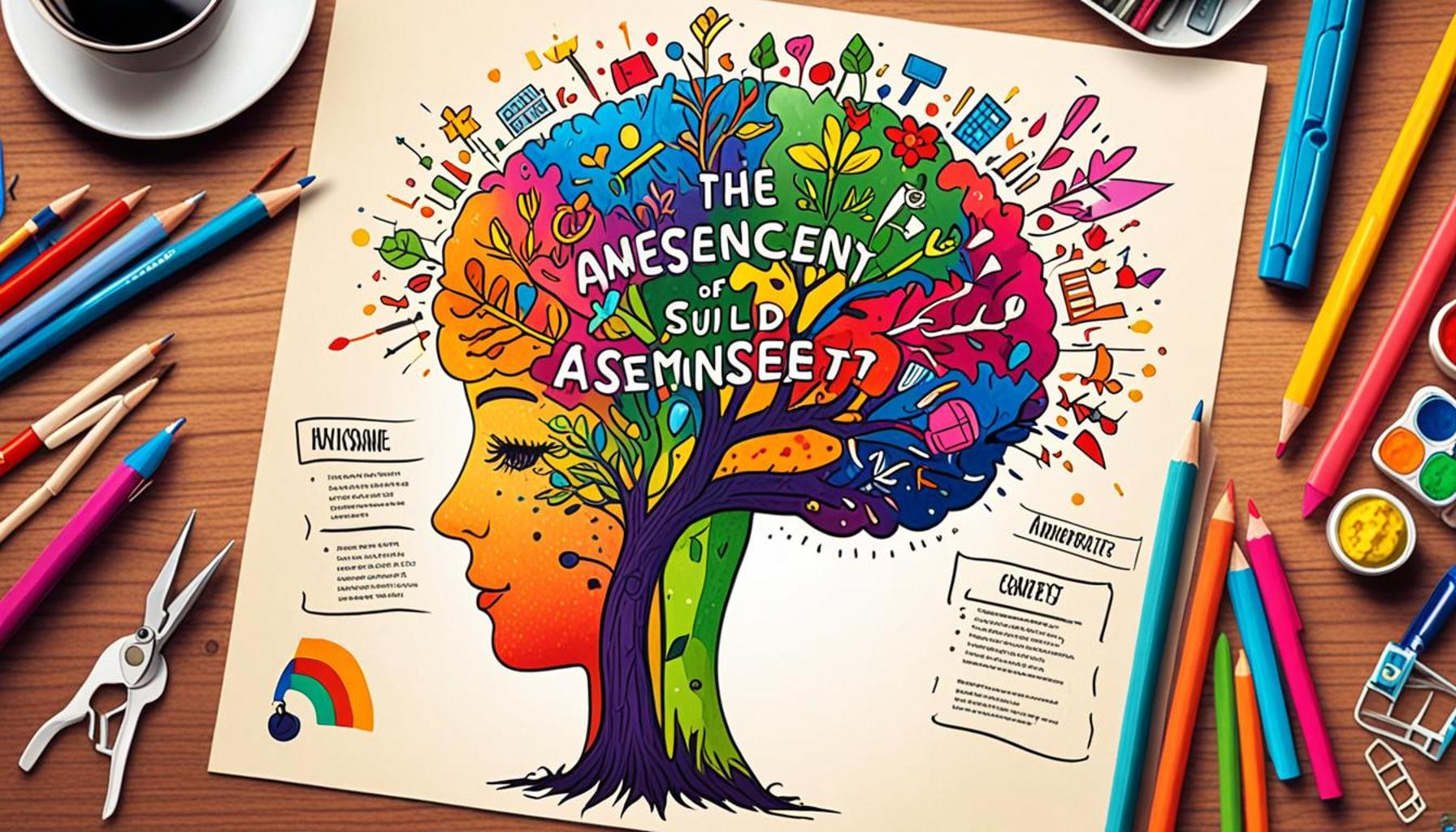The Importance of Self-Assessment in Building a Growth Mindset

The Importance of Self-Assessment in Today’s World
In the modern era, where change is a constant and opportunities can arise unexpectedly, the practice of self-assessment is crucial for anyone looking to maximize their potential. This proactive approach allows individuals to gain a deeper understanding of their strengths, weaknesses, and overall capabilities. Unlike superficial reflection, self-assessment dives deeper into personal metrics and encourages a commitment to fostering a growth mindset.
Why Self-Assessment Matters
- Realization of Potential: Through the lens of self-assessment, individuals can take stock of their unique abilities. For instance, a university student majoring in engineering might recognize their analytical skills but identify their public speaking as a weak point. This realization can empower them to seek opportunities like joining a debate club or attending workshops to enhance their communication skills.
- Enhancement of Skills: Regular self-evaluation not only facilitates skill refinement but also promotes the acquisition of new capabilities. For example, consider a market vendor in Lagos who regularly assesses their sales strategy. By reflecting on what works and what doesn’t, they can adapt their approach, learning to use social media for marketing, thereby reaching a broader customer base.
- Informed Decision Making: Understanding one’s personal values and identifying areas for growth leads to more strategic life choices. For instance, a young professional evaluating their career path may realize their passion for environmental advocacy. This insight can lead them to switch to sectors focused on sustainability, aligning their career with their values and interests.
In Nigeria, where the populace encounters a myriad of challenges ranging from economic volatility to social dynamics, self-assessment can act as a powerful catalyst for empowerment. Whether it’s aligning academic pursuits with entrepreneurial goals or adapting to the rapid changes in local market demands, self-assessment can pave the way for success.
Building a Growth Mindset
A growth mindset embraces the idea that abilities and intelligence can be cultivated through dedication and hard work. Self-assessment forms the bedrock of this mindset. It nurtures an environment of continuous learning, resilience, and adaptability—qualities that are increasingly essential in Nigeria’s fast-evolving landscape.
Engaging in self-assessment not only facilitates a deeper understanding of oneself but also encourages individuals to tackle challenges head-on. For instance, a teacher witnessing a lack of engagement in their classroom can use self-assessment to refine their teaching methods, incorporating new technologies or interactive learning styles. This proactive transformation not only benefits the educator but enriches the learning experience for students.
Ultimately, the journey of self-discovery through self-assessment offers invaluable insights into personal and professional evolution. As individuals embark on this path, they unlock their inherent potential, equipping themselves to face the future with confidence and purpose.
ADDITIONAL INSIGHTS: Expand your understanding here
The Role of Self-Assessment in Personal Development
To embark on a successful journey of personal and professional growth, self-assessment serves as a crucial tool for individuals in Nigeria and beyond. This ongoing process involves critically evaluating one’s abilities, behaviors, and performance to identify areas of strength and opportunities for improvement. Self-assessment not only provides clarity about where one currently stands but also illuminates the path forward—a necessary aspect of developing a growth mindset.
Understanding Strengths and Weaknesses
Recognizing one’s strengths and weaknesses is paramount for anyone looking to build a growth mindset. In a competitive job market like Nigeria’s, where opportunities can be sparse, understanding what makes you unique can set you apart. A graphic designer, for example, may realize through self-assessment that they excel at creativity but struggle with time management. Armed with this knowledge, they can adopt strategies such as scheduling tasks or utilizing productivity apps, enhancing both their work quality and efficiency.
- Clarifying Goals: Self-assessment allows individuals to clarify their short-term and long-term goals. By aligning these goals with their strengths, people can create actionable plans that facilitate progress. For instance, an aspiring software developer in Ibadan may assess their coding skills and set a goal to contribute to an open-source project, ensuring they gain real-world experience while also bridging skill gaps.
- Encouraging Accountability: Engaging in regular self-evaluation fosters a sense of accountability. A student, for instance, may reflect on their study habits and recognize that procrastination hinders their performance. By holding themselves accountable, they can implement better time management strategies, thus laying the groundwork for academic success.
- Fostering Resilience: Self-assessment encourages resilience by helping individuals navigate setbacks. When someone identifies a failure or challenge, rather than viewing it as a defeat, they can analyze their approach and learn from it. This is particularly evident in Nigeria’s entrepreneurial sector, where business owners frequently assess their strategies to recover from setbacks and pivot toward success.
In practical terms, self-assessment can transform lives. For instance, someone working in the food sector might assess their customer service skills and discover a need for improvement. By recognizing this area for growing, they might invest time in customer relationship training, which not only enhances their skills but may also lead to increased sales and customer loyalty.
Ultimately, the act of self-assessment empowers individuals to take charge of their personal and professional journeys. With each evaluation, they are provided with the insights necessary to foster a growth mindset, equipping them with the tools needed to embrace challenges and pursue opportunities with renewed vigor. In a world filled with unpredictability, the ability to critically assess oneself is not just beneficial; it’s essential.
| Advantage | Description |
|---|---|
| Enhanced Self-Awareness | Self-assessment allows individuals to understand their strengths and weaknesses, leading to a more nuanced personal development plan. |
| Improved Learning Strategies | By recognizing areas that need improvement, individuals can adopt tailored learning strategies that resonate with their growth mindset. |
| Motivation Boost | Awareness of progress through self-assessment can provide a significant motivation boost, reinforcing the desire to achieve further growth. |
| Goal Setting | Self-assessment enables better goal setting as individuals can create realistic and attainable objectives based on their evaluations. |
| Emotional Regulation | Understanding personal triggers during self-assessment can enhance emotional regulation, allowing for calmer and more rational responses to challenges. |
Self-assessment acts as a cornerstone in developing a growth mindset, pushing individuals to embrace their learning processes and continually strive for improvement. The insights gained can profoundly influence one’s learning journey, making self-reflection an invaluable tool for personal and professional growth. It’s through this continuous cycle of evaluation and adaptation that people can unlock their fullest potential. Furthermore, armed with a strong sense of self, individuals can become more resilient, effectively navigating obstacles with a mindset geared towards growth and adaptability.
RECOMMENDED: Check out this similar article
Self-Assessment as a Catalyst for Lifelong Learning
Self-assessment plays a pivotal role not only in identifying current skills but also in cultivating a passion for lifelong learning—an essential component of a growth mindset. Individuals who embrace continuous self-evaluation are more likely to stay adaptable and open to new experiences, essential traits in a fast-evolving workforce. In Nigeria, where technological advancements and globalization are reshaping industries, developing a learning-oriented mindset must take center stage.
Embracing Feedback
Incorporating feedback from peers, mentors, or supervisors into self-assessment routines is particularly valuable. By understanding how others perceive their work, individuals can gain diverse perspectives that are often unattainable through self-evaluation alone. For example, a budding entrepreneur in Lagos might solicit feedback from clients about their products, enabling them to iterate and improve offerings based on customer insights. This practice not only sharpens business acumen but also aligns closely with a growth mindset, where criticism is seen not as a setback but as a tool for development.
- Building Emotional Intelligence: Active self-assessment encourages the development of emotional intelligence, allowing individuals to manage their emotions effectively while understanding the emotions of others. Equipped with emotional intelligence, professionals can navigate workplace challenges more adeptly, fostering collaborative relationships and improving team dynamics. For instance, a manager who self-assesses their leadership style can modify their approach to accommodate team members’ emotional needs, thereby nurturing a more productive environment.
- Cultivating a Love for Challenges: Individuals who regularly engage in self-assessment often develop a heightened appreciation for challenges. In Nigeria’s diverse educational landscape, students who adopt this habit might find encouragement in tackling difficult subjects without fear of failure. By redefining challenges as opportunities, they are more likely to engage earnestly in their learning journey, reinforcing a growth mindset.
- Enhancing Decision-Making Skills: Self-assessment leads to better decision-making. When individuals analyze their past choices and outcomes, they can refine their judgment for future situations. This is especially critical in Nigeria’s business climate, where strategic decision-making can make or break ventures. Entrepreneurs who critically evaluate their decisions, learn from missteps, and strategize accordingly are more capable of navigating the complexities of an unpredictable economy.
Furthermore, the incorporation of technology into self-assessment processes has become more prevalent. Various applications and online platforms facilitate systematic tracking of progress in both personal endeavors and professional development. For instance, an aspiring digital marketer in Nigeria could leverage analytics tools to assess campaign performance, gaining insights that inform future strategies. This tech-driven approach underscores the synergy between self-assessment and a growth mindset, illustrating that modern solutions can significantly enhance learning and progression.
In summary, self-assessment serves as a cornerstone of lifelong learning, empowering individuals to gather feedback, develop emotional intelligence, embrace challenges, and enhance decision-making skills. As Nigerians cope with evolving career landscapes, the ability to reflect and adapt becomes not only a pathway to personal enrichment but also a vital asset in promoting a culture of growth mindset across different sectors.
LEARN MORE: This related article may interest you
Conclusion: The Essential Role of Self-Assessment in Fostering a Growth Mindset
In conclusion, self-assessment emerges as a fundamental practice in nurturing a growth mindset, especially in today’s fast-paced and ever-evolving landscape. By engaging in self-evaluation, individuals not only gain a clearer understanding of their strengths and weaknesses but also open the door to a continuous improvement journey. This process of reflection leads to enhanced adaptability and resilience—qualities that are particularly critical in a Nigerian context where innovation is reshaping the economy.
Moreover, the integration of feedback into self-assessment highlights the value of external perspectives in personal and professional growth. By interpreting feedback constructively, individuals can refine their skills and better align their aspirations with current market demands. For example, Nigerian students and professionals can benefit significantly from leveraging peer review systems, thereby boosting their emotional intelligence and collaboration skills.
Ultimately, as we encourage a culture of self-reflection and feedback, we empower not only ourselves but also our communities. As economic challenges and opportunities arise, those equipped with a growth mindset will be better positioned to thrive, innovate, and contribute meaningfully to society. As we journey forward, it becomes clear that self-assessment is not merely a tool for personal development but a crucial element in fostering a dynamic, resilient workforce capable of navigating the complexities of our times.


